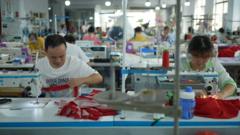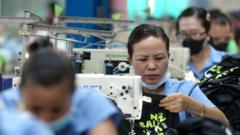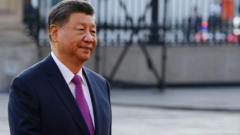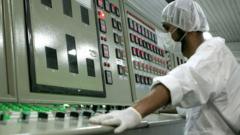**Experts predict that the new tariffs could undermine the African Growth and Opportunity Act (AGOA), threatening thousands of jobs in Africa and altering international trade dynamics.**
**Trump’s Tariffs Threaten Lifeline of US-Africa Trade Relations**
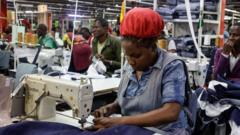
**Trump’s Tariffs Threaten Lifeline of US-Africa Trade Relations**
**Recent tariffs imposed by President Trump put at risk long-standing trade agreements with African nations, particularly striking Lesotho's textile industry.**
Lesotho's textile sector faces grave uncertainty following President Donald Trump's recent introduction of a staggering 50% import tariff on the nation’s exports to the US. Teboho Kobeli, who owns Afri-Expo Textiles and employs 2,000 people, voiced his despair over the news, highlighting the monumental impact of the tariffs on his business and the livelihoods of many in Lesotho.
Lesotho has emerged as a key beneficiary of the African Growth and Opportunity Act (AGOA) – a 25-year US legislation designed to foster trade and economic growth in Africa through guaranteed duty-free access for certain goods. The Act's intention was to promote industrialization and lift countries from poverty, underpinning crucial employment in various sectors, particularly textiles.
The introduction of these tariffs creates uncertainty around AGOA as companies and governments grapple with conflicting messages from Washington. Countries such as South Africa, which exports valuable metals and automobiles to the US, believe the new tariffs signal a significant blow to the AGOA framework. Conversely, Kenyan officials argue that the existing AGOA framework, valid until September 2025, would still provide some immediate safeguards against the new tariffs.
While Kenya aims to remain competitive, other nations worry that the escalating tariffs undermine the potential for AGOA's renewal, a pivotal legislation that was scheduled for reassessment this year. The law historically enabled duty-free access for diverse African goods while promoting free market policies and human rights standards across the eligible 32 sub-Saharan countries.
Despite Lesotho's substantial growth in the textile market, with prominent brands like Walmart and GAP sourcing garments locally, the looming threat of a 50% tariff could decimate its manufacturing base. Mukhisa Kituyi, a former senior UN trade official, projected devastating economic repercussions, estimating a 1% drop in GDP within two years should AGOA access be revoked.
As discussions around trade intensify, analysts suggest that higher tariffs could adversely affect American influence in Africa, with nations like China potentially seizing the opportunity to expand their market presence. Michelle Gavin from the Council on Foreign Relations warned that the Trump administration's capricious policies might alienate critical trading partners in Africa.
The AWI has been recognized as an essential vehicle of US soft power, fostering goodwill in countering the rising presence of China and Russia on the continent. While AGOA renewal attempts, like the one proposed by Senator Chris Coons, exist, many analysts deem the outlook grim given the current political landscape dominated by declining bipartisan support for non-reciprocal agreements.
As trade tensions brew, if AGOA falters, African nations may be forced to forge stronger intra-continental trade relations and seek new partnerships to sustain their economies amidst harsh global shifts.


